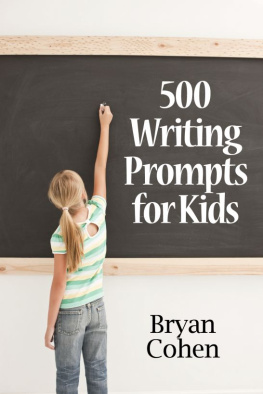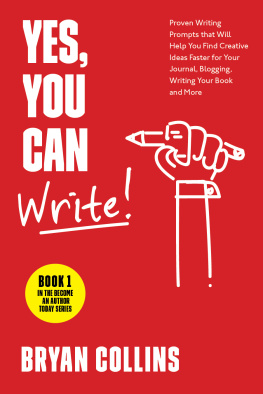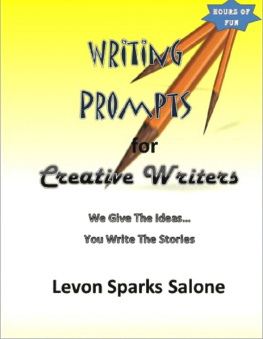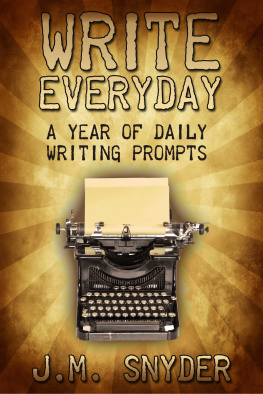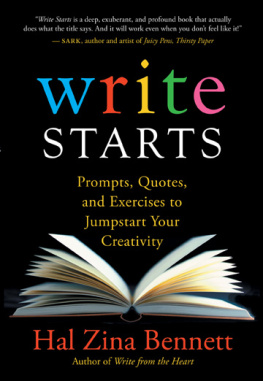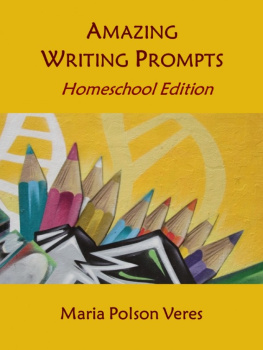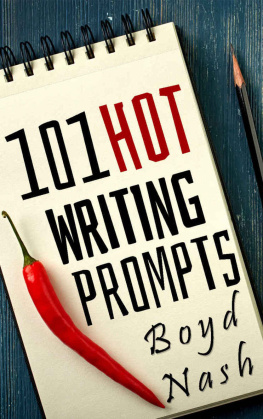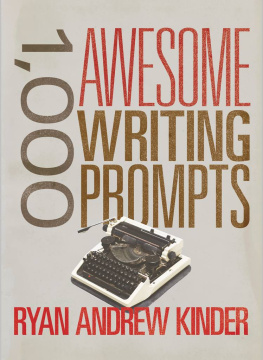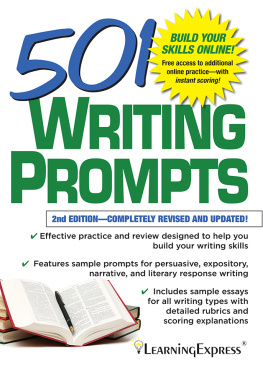500 WRITING PROMPTS FORKIDS:
FIRST GRADE THROUGH FIFTHGRADE
by
Bryan Cohen
SMASHWORDS EDITION
* * *
PUBLISHED BY:
Bryan Cohen on Smashwords
500 Writing Prompts forKids:
First Grade through FifthGrade
Copyright 2011 by BryanCohen
Discover other books by BryanCohen:
1,000 Creative WritingPrompts: http://www.smashwords.com/books/view/34347
Sharpening thePencil: http://www.smashwords.com/books/view/50078
Smashwords Edition LicenseNotes
This ebook is licensed for yourpersonal enjoyment only. This ebook may not be re-sold or givenaway to other people. If you would like to share this book withanother person, please purchase an additional copy for each personyou share it with. If you're reading this book and did not purchaseit, or it was not purchased for your use only, then you shouldreturn to Smashwords.com and purchase your own copy. Thank you forrespecting the author's work.
* * *
Table ofContents
Why Kids Need to Write
Several hundred years ago, it was thestandard in most schools to learn things like diction, handwriting,poetry and complete sentences along with additional languages likeLatin and Greek. Over the years, some of these teachings havefallen completely by the wayside and unfortunately, one of thoseskills lost has been the ability to write and express thoughts.
Its not all the fault of the teachers andthe education system. One of the major perpetrators of this loss ofgrammar and syntax is the advent of new forms of technology.Between Twitter and texting, Facebook and television, kids areeither both too busy and over-stimulated to express themselveseloquently, or theyre so used to keeping things under 140characters that they simply dont know how.
In addition, by limiting their sentences,these adolescents may also be limiting their thoughts and theirabilities to express themselves. It seems like once a week I hearsome horrible story online about a kid who was bullied or pressuredinto doing something drastic like firing a gun or committingsuicide. Im not saying that writing in a journal or expressingyour thoughts in poetry could change all of that, Im just sayingit never hurts to give kids an additional method of getting outtheir feelings in a peaceful way.
I have had the fortune of tutoring severalstudents of varying ages from fourth grade all the way up totwelfth grade. Now, while I dont have the largest sample set inthe world, I noticed a disheartening trend. None of them trulyunderstood how to complete a competent sentence. I would go throughan entire paper and see something I could change about nearly everysentence on the page. For whatever reason, these kids stillcontinued to get As and Bs despite a major lack of rudimentaryskills in their native language. Are kids slipping through thecracks of the educational system when it comes to writing?
These are just a few of the many reasons whyit is so important to get our kids writing at an early age. Im nosocial scientist, but I would imagine if we took our kids away justone hour a day from their social networking and computer time andgave them a pencil and paper they would do a much better job atschool and they would be able to think more effectively forthemselves.
How Writing Prompts Work
Enclosed in this book, you willfind 500 writing prompts for you and your kids to enjoy. Why do Iinclude you inthere along with your kids? Ill get to that in the nextsection.
A writing prompt is a question or anactivity that is meant to get your childs mind going and hispencil moving. Prompts can act as catalysts to start a story, apoem, a journal entry, a blog post or even a school assignment.Each writing prompt could be used for something as simple as a 200word daily entry or even an entire novel. Even just one writingprompt might be enough to get your child writing for a lifetime.Since that may be a very special case, Ive decided to include 500of them in case your child needs a bit of a writing refresher everyday.
In addition, each prompt can be used as manytimes as you want. If a child sees a prompt like What do you wantto be when you grow up and why? (and the why is quite importantto ensure a response longer than two or three words) he might sayhe wants to be an astronaut and go into all the reasons that makeup his decision. A day later (perhaps maybe even a few hours later)he might have seen a Western movie starring John Wayne and say thathe now wants to be a cowboy! I have tried to leave every prompt inthe book as open as possible so that you can use them over and overagain if desired.
Now, Im a big paper and pencil fan, so Irecommend that you get your child hooked to these important writingtools early on. I realize that typing on a computer can be a lotmore convenient, but there are many benefits to writing by hand.Using your hand to actually write out every letter takes more timebut there is some belief that it actually may be better for thebrain. There have been experiments that show that writing words out(especially in cursive script) may train the parts of the brainassociated with speech, writing and motor skills. When I mentionedthe schools from hundreds of years ago, one of their mainactivities was to write out letters and words in beautiful cursivescript. This activity has been lost in many schools (other than thestrictest of Catholic schools, from what Im told) becausecurriculum creators believe there is no immediate benefit to it.Im not a school administrator, but I do know that if I had achance to make my kid even a little bit more like Shakespeare, Idjump on the opportunity.
Let me get back on subject so you set up alittle work station for your child, with some pencils and paper.Give them a prompt or a few prompts from this book and perhaps atime limit (kids can get a bit jumpy at open-ended things,especially when television beckons). The first few times you maywant to supervise and make sure that they are putting some effortinto it. Over time, your kids may find that this quiet writing timeis a blessing and not a curse and they may start writing from theprompts without your intervention at all.
Monkey See, Monkey Do
Has this ever happened to you? You worktirelessly to get your child to stop a bad habit like biting hernails or to start a good one like making her bed or cleaning herroom. Despite your best efforts you are unsuccessful. One day yourealize that the main reason behind her not stopping or startingthis task is because you dont do it yourself! Perhaps the samething has happened with schoolwork as your child has said, Math isstupid, I hate math! and you found yourself only half-heartedlydisagreeing because you felt the exact same way as she did?
This is a classic case of Monkey See,Monkey Do and it just goes to show that if you want your child tostart writing, you may just need to buckle down and do it yourself.If youre like me, you may thoroughly enjoy your writing time andyou would cherish the time spent writing with your child. But ifyoure like most people, youll be itching to get back to your worke-mails and your DVR to watch the shows you need to catch upon.
The best way to ensure yourchild gets into writing is to make sure that you are into writing. Try writing atthe same time as your child and maybe even use the same prompt. Ifyour child sees that daddy or mommy enjoys writing, he wont be toofar off enjoying it himself. Perhaps, you may even get someenjoyment out of writing as well.
Teaching Applications
This book works fantastically for use in theclassroom. All the prompts have been created in such a way to fitbetween the ages of first and fifth grade but they can certainly beadapted to skew older or younger if necessary.
Try using the book for the following:
Next page
